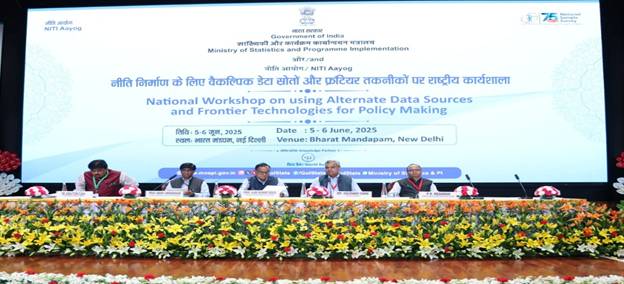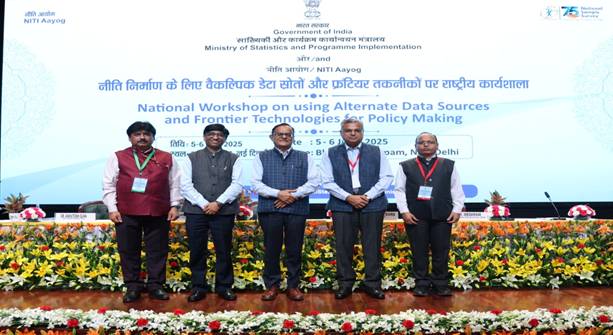Ministry of Statistics & Programme Implementation
MoSPI organized a National Workshop on “Using Alternate Data Sources and Frontier Technologies for Policy Making” during 5-6 June 2025
Need of the best policy which blends both traditional and alternative data sources, says Prof. Ajay Kumar Sood, PSA to GoI
Need for institutionalized hybrid data ecosystem which has equal place for traditional & alternate data sources: Prof. Abhay Karandikar, Secretary, DST
Alternate data sources can be used in real time to supplement traditional data sources for policy making: Dr. Saurabh Garg, Secretary, MoSPI
Posted On:
07 JUN 2025 11:42AM by PIB Delhi
The Ministry of Statistics and Programme Implementation (MoSPI), in collaboration with NITI Aayog and the World Bank as knowledge partner, conducted a two-day National Workshop on ‘Using Alternate Data Sources and Frontier Technologies for Policy Making’ at Bharat Mandapam, New Delhi during 5-6 June, 2025.
The National Workshop concluded with a Valedictory Session on 6 June, 2025. The Valedictory Session was graced by Prof. Ajay Kumar Sood, Principal Scientific Advisor (PSA) to GoI as the Chief Guest; Prof. Abhay Karandikar, Secretary, D/o Science and Technology; Dr. Saurabh Garg, Secretary, MoSPI and Shri P.R. Meshram, Director General, MoSPI. The two-day workshop was attended by over 450 participants from central ministries, state governments, international organisations including the World Bank, academic and research institutions, and private sector entities.
In his address, Prof. Ajay Kumar Sood, Principal Scientific Advisor to GoI and the Chief Guest of the event emphasized that alternate data sources and frontier technologies are increasingly becoming critical for policy making. These high frequency indicators are more dynamic and offer timely insights, enabling policies to be more agile and responsive. While traditional data sources reflect where we have been, the alternate data sources indicate where we are heading. He added that though alternate data sources provide real time information at a much granular level, they cannot replace tradition data sources. He emphasized the need for the best policy which blends both traditional and alternative data sources. He highlighted various use-cases where alternate data sources have been effectively used. He stressed on the need for collaboration between Government, academia, researchers, industry and international organizations for effective use of new technologies. He also called for ethical deployment of AI and said that data security and privacy concerns cannot be compromised. Further, he asserted that the development of techno-legal framework for Digital Public Infrastructure is a gift of India to the World.

Prof. Abhay Karandikar, Secretary, D/o Science and Technology in his address remarked that the policy making process is a complex exercise which involve gathering of data, consultation with stakeholders and drawing insights. AI/ML has facilitated timely processing of data for designing actionable policies. In this age and time, challenge is not to collect data but how to make sense of the data. The real challenge lies in addressing issues relating to data privacy, data security, regulatory framework, and institutional readiness. He emphasized on the need for institutionalized hybrid data ecosystem which has equal place for both traditional and alternate data sources.
Dr. Saurabh Garg, Secretary, MoSPI, in his address emphasized on the need of fostering collaboration with various stakeholders for developing a robust statistical system to address the data needs for policy making. He opined that as survey data becomes available with a time lag; alternate data sources can be used to supplement traditional data sources for policy making in real time. While quoting the United Nations Fundamental Principles of Official Statistics, he emphasized that for statistical purposes best combination of the four data sources, namely surveys, censuses, administrative records and alternate data sources may be drawn with quality and timeliness along with limiting cost and respondent burden. He expected that in next 3-6 months, MoSPI will be able to implement some of the use cases that have been identified to harness alternate data sources and the application of frontier technologies. He thanked World Bank for conceptualizing and NITI Aayog for collaborating with MoSPI in organizing this workshop and expressed that India will be at the forefront of integrating alternate data sources and frontier technologies in the National Statistical Frameworks.
In the welcome address, Shri P.R. Meshram, Director General (Data Governance) expressed gratitude to NITI Aayog, World Bank, and other participants for their active involvement during the course of two-days event. He added that the workshop has not only deepened our understanding of the challenges in integration of alternate data sources in the statistical system of the country, but also helped charting out the solutions to the challenges.

The key highlights of the four technical sessions on the subjects, viz, AI and Data Science for Official Statistics; Mobile Phone Data for Tourism Statistics; Geo-spatial Data for Sampling, Ocean Accounting and Data Dissemination and Scanner data for CPI compilation held during Workshop were also discussed during the valedictory session along with key takeaways. Some of the salient points of the technical sessions are as under:
(i) AI and Data Science for Official Statistics:
Technical sessions on the subject started with setting the context for use of AI and data science in official statistics and identifying key stakeholders. Way forward for National Statistics Office considering the stage it is in i.e. from pilot stage to production stage was discussed during the session. Shri Abhishek Singh, CEO India AI and Ms Debjani Ghosh, Chief Architect, Frontier Tech Hub, NITI Aayog, Shri Ankit Bose, Head AI, NASSCOM, Prof. Balaraman Ravindran, IIT-Madras, Mr. Richard Campbell, UK ONS; and Mr. Thomas Danielewitz, Ms. Malar Veerappan, Ms. Shreya Dutt from World Bank were among the key speakers.
(ii) Mobile Phone Data for Tourism Statistics:
Technical Sessions on the subject focused on discussion to devise a methodological framework using mobile phone data for tourism statistics tailored to Indian needs and covered relevant issues like data privacy and regulatory challenges. Use-cases from other countries for tourism, urban mobility and infrastructure assessment were discussed during the technical session. Shri Safi A. Rizvi Advisor, NDMA, Mr. Siim Esko, International Project Development Lead, Positium, Ms. Esperanza Magpantay, Senior Statistician, International Telecommunication Union, Ms. Titi Kanti Lestari, Atma Jaya University, Indonesia, Mr. Asit Kadyan, D/o Telecommunication, GoI and Mr. Sagar Mathur, Vice President, Airtel were among the key speakers.
(iii) Geo-spatial Data for Sampling, Ocean Accounting and Data Dissemination:
Technical Sessions on Geo-spatial Data for Sampling, Ocean Accounting and Data Dissemination of the workshop highlighted the transformative potential of geospatial technologies in enhancing official statistics, with a focus on updating sampling frames in urban areas, improving data collection, integration, and dissemination. The latter part of the technical session was devoted for exploring the application of geospatial data in ocean accounting. The session featured enriching presentations and discussions by Mr. Richard Campbell, Deputy Director, UK Office for National Statistics; Ms. Kate Hess, Solution Engineer, ESRI; Shri Srikant Shastri, Chairperson, Geospatial Data Promotion & Development Committee; and Ms. Anija Shukla, Environment Specialist, World Bank, Ms. Rashmi Verma, Co-Founder, MapMyIndia along with experts from NRSC, INCOIS, NCCR and various academic and research institutions. Speakers demonstrated advanced geospatial tools integrated with AI techniques for feature extraction, change detection, and spatial stratification, showcasing use cases that illustrated the value of GIS-AI convergence for dynamic visualizations, real-time dashboards, and evidence-based policymaking.
(iv) Scanner data for CPI compilation:
Technical sessions on the subject covered concepts and methodologies related to scanner data, web scraping techniques, requisite IT infrastructure and other available alternative data sources for integration in Consumer Price Index (CPI). Key speakers in the session were Mr. Federico Polidoro, World Bank; Mr. Luigi Palumbo from Bank of Italy, Prof. Himanshu from JNU, Dr. Aditi Chaubal from IIT Bombay, Shri Anand Agarwal from V-Mart, Ms. Sonu Shah from Nielsen IQ and many others from industry and academic organisations. Sessions provided valuable insights for accelerating MoSPI’s ongoing efforts for integration of alternative data sources, particularly scanner data and e-commerce data in CPI compilation methodology.
The workshop concluded with the vote of thanks by Dr. Ashutosh Ojha, DDG, MoSPI. He expressed gratitude to the Chief Guest, other dignitaries, participants from Multilateral agencies, industries, academia, researchers as well as officers from both central and state governments for gracing the event.
*****
Samrat/Allen
(Release ID: 2134758)
Visitor Counter : 199